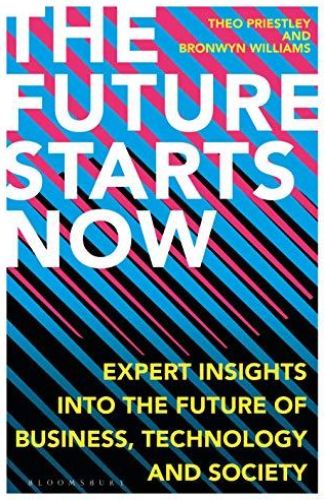Bronwyn Williams – economist – and Theo Priestley – anti-futurist – provide a collection of compelling essays on the changes and challenges the onrushing future may bring, and suggest actions you can take to preserve your work and your freedom.

Tomorrow Is Here
Bronwyn Williams – futurist, economist and trend analyst – and Theo Priestley – anti-futurist – agree that futurists don’t predict the future, they change it. The pair insist that no one inevitable future exists. Instead, there are many possible futures that you have the power to shape. To promote and codify that activism, Williams and Priestley offer a diverse collection of essays that provides myriad visions of the future and connects those visions to decisions you must make today. The essayists share the editors’ activist perspective, which makes for compelling and, at times, radical opinions. Readers interested in forming the future – rather than having the future run them over – will embrace many of the ideas herein.
Information Technology
Chris Yiu, executive director of the Technology and Public Policy Team at the Tony Blair Institute for Global Change, believes new technologies will change the economy as profoundly as the Industrial Revolution changed the 19th-century economy – but faster. Today’s skills, he points out, become obsolete in roughly five years.
The new geopolitical fault lines emerging are virtual rather than geographic.Chris Yiu
The cost structure of tech firms motivates rapid scaling. Marginal costs for new users are minimal, Yiu notes, driving firms into winner-takes-all competition. With users numbering in the billions, large tech firms’ corporate policies can affect society as significantly as the laws of nations, and the largest tech companies’ power now rivals government power. Yiu regards these as sinister developments.
Universal Basic Income
David Tal, a consultant at Quantumrun Foresight, relates how the COVID-19 pandemic-related economic slowdown demonstrated that the majority of the population could not survive a single month without income. To encourage people to stay home, governments made direct cash transfers to those earning the least. Tal claims this decision became an inadvertent test run for the concept of universal basic income (UBI): Government provides every citizen with the same basic income, with no conditions or barriers to access.
Tal names Martin Luther King Jr., economists Milton Friedman and F.A. Hayek, and former president Richard Nixon as UBI champions. In a future of increasing automation of labor, unemployment will skyrocket. Without support, only a small pool of essential workers will retain purchasing power; and, Tal cautions, they do not represent a sufficient consumer base to keep the economy functioning. Tal’s answer to the potential collapse of the modern mass consumption economy is a UBI.
Industrialized Remnant
Andrew Vorster, futurist, describes traditional schooling as a remnant of industrialization, when public education sought to teach children a standard skillset to prepare them for the workforce. He finds that, in an era of rapidly changing work, no standardized set of skills will suffice. Likewise, standardized testing, which emphasizes memorization, is counterproductive when workers must continually learn new skills.
65% of children entering primary education will be entering jobs that haven’t been invented yet.Andrew Vorster
Vorster maintains that digital education offers more personalized education opportunities, as it lets each child learn what interests him or her.
Pretirement
Anne Skare Nielsen, futurist, offers fascinating insights into how the industrial age created the concept of retirement, and retirement created old age as we know it. The abundance of the industrial age, with its emphasis on efficiency and managing working populations, meant encouraging the idleness of older people who could no longer work in factories.
The future of retirement, she contends, is “pretirement”: periods of work interspersed with periods during which you learn new skills, or spend time on life aspects that matter to you, such as family or community.
Relevance Paradox
Theo Priestley notes that decision-makers often deal with information overload. Technology focuses on producing information without considering the specific questions data should answer. And, he laments, overwhelmed, people stick to what they already know.
The “relevance paradox” describes how professionals rely mostly on their experience to judge what is relevant. In the face of the ever-increasing onslaught of new data, these individuals tend to adhere even more strictly to what they already know. As a result of these factors, Priestley explains, they miss new information that could help them make better decisions. Priestley argues that software designed to support human decision-making often makes the situation worse. He cites how AI designed to respond to user feedback only integrates and repeats its users’ biases. In hierarchically structured organizations, this can lead to the further siloing of information.
Rather than scale back AI, Priestley’s solution is to shift its role: Appoint an AI leader who could support organizations in moving away from rigid hierarchies and encourage more direct communication between teams. The AI could parse granular organizational data to provide relevant information to a workforce and support self-organizing networks of experts and communities in workplaces.
Decide for Yourself
Kate O’Neill details how suggestions derived from your online choices reinforce your previous choices and trap you in behavioral loops, in which you passively accept your biases mirrored back to you.
Amazon had an automated recruiting tool that penalized résumés with the word ‘women’s.’ Humans don’t make hiring decisions without bias, so we can do better, but with machines we’re handing over the keys.Kate O’Neill
Seeing technology as the solution to society’s problems leads people to trust it unquestioningly. O’Neill believes that what matters emerges from the meaning people find in the world, which only humans can produce or understand.
She exhorts you not to hold on to outdated goals or embrace new technology uncritically – acknowledge change, consider the best realistic outcomes change could bring and work toward those ends.
Varied Viewpoints
Williams and Priestley bring a kaleidoscope of viewpoints and subjects together in this highly useful essay collection. At times, the essayists seem to write only for their peers and, in other essays, seem to write expressly for students considering these ideas for the first time. And yet, the overall impact of these essays makes this collection invaluable for tech workers, startup founders, older executives contending with tsunamis of new information and technologies, and anyone who thinks deeply about – or whose livelihood depends upon – the oncoming technological future.








